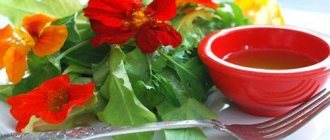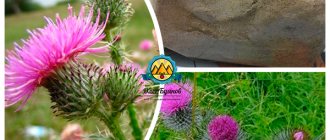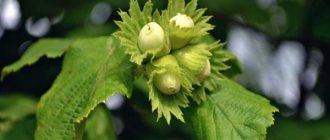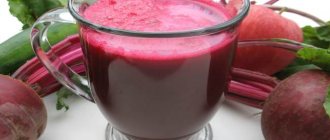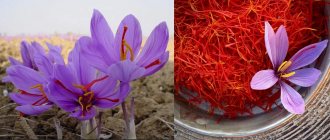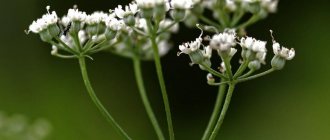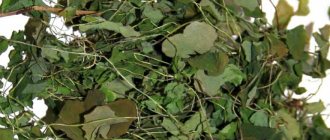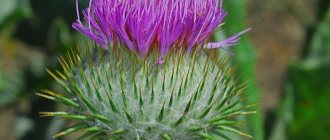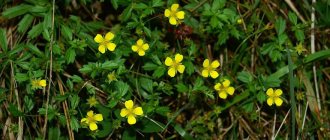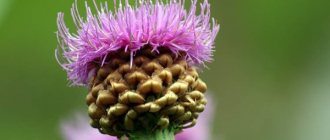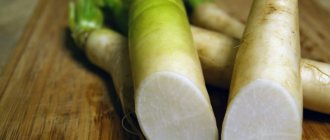Description of the plant
Artichoke (lat. Cynara) is a perennial, herbaceous plant with a large inflorescence, of the Asteraceae family, prefers a warm and dry climate. It looks like an unopened flower bud, which is a collection of large dense scales. It is the lower fleshy parts of the artichoke that are eaten.
The artichoke is native to the Mediterranean, North Africa and Southern Europe, and has been cultivated for more than five thousand years. The stem of this plant is green-gray, branched, even, and can reach up to 2 meters in height. Artichoke flowers are blue or blue-violet and form a large basket with a diameter of about 25 cm. This plant blooms in June and July. Today there are about 140 varieties of artichoke, but only 40 of them are cultivated.
It is worth noting! The scientific name of the artichoke is Cynara, which means “dog” in Greek, which can be explained by the resemblance of the hard leaves to a dog’s teeth.
The artichoke became popular around the world only after it was first prepared by French chefs.
Artichoke is deservedly considered a dietary product. It is perfectly absorbed in the body; in the presence of diabetes mellitus it is recommended as a starch substitute. Since ancient times, artichokes have been recommended for patients with gout and jaundice. In modern medicine, there is evidence of its diuretic and choleretic properties.
During pregnancy, it is recommended to consume up to 2 tbsp. l. useful product.
COMPOSITION OF ARTICHOKE
This food product is rich in a large number of useful elements that are necessary for the human body. Artichoke petals contain essential oils that provide the exquisite taste of this product. Artichokes are considered a low-calorie product, as they contain only 47 kcal per 100 grams of raw product.
| Name | Quantity | Daily requirement |
| Calories | 47 kcal | 2% |
| Carbohydrates | 10.51 g | 8% |
| Squirrels | 3.27 g | 6% |
| Fats | 0.15 g | 0.5% |
| Alimentary fiber | 5.4 g | 14% |
Field artichokes are harvested at different stages of ripening, so calorie content may vary.
Nutritional value ranges from 30 to 47 kcal/100 g of product. Not the entire basket is used for food, but only its lower part. The calorie content is affected by the method of its preparation. The nutritional value of the product increases when using butter, cream and other high-calorie foods.
| Electrolytes | ||
| Sodium | 94 mg | 6% |
| Potassium | 370 mg | 8% |
| Minerals | ||
| Calcium | 44 mg | 4% |
| Copper | 0.231 mg | 27% |
| Iron | 1.28 mg | 16% |
| Magnesium | 60 mg | 15% |
| Manganese | 0.256 mg | 11% |
| Phosphorus | 90 mg | 13% |
| Selenium | 0.2 mcg | <0.5% |
| Zinc | 0.49 mg | 4.5% |
The plant contains:
- folates (vitamin B9) – allow the nervous system to function well;
- ascorbic acid is a well-known antioxidant;
- thiamine (vitamin B1) – fights toxins;
- pyroxin (vitamin B6) – improves protein absorption;
- riboflavin (vitamin B2) – necessary for enzymes important for the body;
- Vitamin K is rarely found in foods, but is essential for the body.
| Vitamins | ||
| Vitamin A | 13 IU | 0.5% |
| Vitamin B1 | 0.072 mg | 6% |
| Vitamin B2 | 0.066 mg | 5% |
| Vitamin B3 | 1.046 mg | 6.5% |
| Vitamin B5 | 0.338 mg | 7% |
| Vitamin B6 | 0.116 mg | 9% |
| Vitamin B9 | 68 mcg | 17% |
| Vitamin C | 11.7 mg | 20% |
| Vitamin E | 0.19 mg | 1% |
| Vitamin K | 14.8 mcg | 12% |
In ancient Greece and Rome, people believed that this product was a strong aphrodisiac, and it could influence who was born into a family - a boy or a girl. In France, many women were not allowed to eat artichokes because they had stimulating properties.
Artichoke - contraindications
Artichoke consumption is contraindicated for children under 12 years of age, as well as for women who are breastfeeding and pregnant. The same restriction applies to people suffering from liver failure and bile duct blockage.
Also find out...
- How to completely remove cellulite
- Instant rejuvenation for 10-15 years! How it's done.
- How to lose 4 kg per month without harm to your health
- All procedures for the beauty of the figure...
- The real way to enlarge breasts
- What should a woman smell like?
- Hollywood smile: how to whiten teeth in 30 minutes
- Healthy veins mean beautiful legs. Check your foot health.
- https://zhenskoe-mnenie.ru/themes/health/artishok-l...stva-i-primenenie-v-meditsine/
==========================================================================================================
31
Artichoke is a herbaceous plant of the Asteraceae family with large inflorescences, the lower fleshy parts of which are used for food. An artichoke is an unopened flower bud of a plant, consisting of large, fleshy scales. The homeland of the artichoke is the Mediterranean. Currently, the vegetable is very popular in America (especially in California), where it was brought by French and Spanish settlers.
Both very young buds—flowers—and later ones—cones—are used in cooking.
Small cones are ideal for appetizers, medium-sized artichokes are ideal for stewing and frying. Fresh artichoke hearts are cut into thin pieces and added to salads. They pair wonderfully with rice dishes, such as Italian risotto.
When eaten raw, the artichoke tastes like an unripe walnut.
When choosing artichokes, pay attention to the fact that they are evenly green in color, not limp and not too dry, and the size of the artichokes may not worry you, since a vegetable of any size will find its place on the dinner table.
Calorie content of artichoke
Both Spanish and French artichokes are considered a low-calorie dietary food and contain only 47 kcal per 100 g. The calorie content of boiled artichokes without salt is 53 kcal. Eating artichokes without harm to health is recommended even for overweight people.
Nutritional value per 100 grams:
| Proteins, g | Fats, gr | Carbohydrates, g | Ash, gr | Water, g | Calorie content, kcal |
| 1,3 | 0,2 | 6,5 | 1,3 | 90 | 47 |
/edaplus.info/images/ico/like.png" target="_blank">https://edaplus.info/images/ico/like.png) 8px 8px no-repeat rgb(242, 255, 174);" >
Use of artichoke to treat diseases
| Diuretic, for urinary retention and dropsy. | eat artichokes or drink up to 1/2 cup of fresh juice squeezed from the plant in the morning and evening. |
| Reducing the level of “bad” cholesterol and improving heart function. | 1) You need to eat boiled fruits. 2) Lightly mash 250 g of artichoke leaves, pour 1 liter of vodka over them and leave for 10 days. Then strain and take 2 times a day, 1 tablespoon between meals. |
| For diseases of the liver, kidneys and gall bladder. | Pour 2 teaspoons of dried leaves of the plant into 300 ml of boiling water. Leave for 15-20 minutes, then strain. To improve the taste, you can add honey to the warm infusion. Drink the infusion twice a day 30 minutes before meals. |
| Constipation | - drink artichoke juice mixed with fresh egg yolks. - decoction: to prepare it, take 2 tablespoons of finely chopped unopened artichoke inflorescences and pour 1 glass of boiling water. Place in a boiling steam bath for 30 minutes. Cool and filter. Take 2 tablespoons 15 minutes before meals, 3 times a day. |
| Relief of hangover syndrome. | artichoke infusion or tea. |
| For disorders of the stomach and nervous system, for colds, inflammation of the respiratory tract. | Decoction of inflorescences |
| Increased sexual power | fresh juice squeezed from plants, 1/4 of a glass in the morning and evening. |
| For stomatitis, thrush, cracked tongue in children. | rinsing the mouth with artichoke juice mixed with honey. |
| Rheumatism | take 1/4 cup juice with 1 tablespoon of honey 3 times a day. |
| Activates the activity of the brain and central nervous system. | Place the artichoke leaves in an enamel bowl and pour in enough water to just barely cover the leaves. Cover the dish with a lid and place in a water bath for 2 hours. Then strain the broth, carefully squeezing out the leaves. Take 3-4 tablespoons 3 times a day. |
| For liver diseases and constipation | A decoction of artichoke baskets mixed with fresh egg yolks. |
| For diseases of the liver and biliary tract | Decoctions of artichoke leaves (up to 1.5 cups per day). |
| Removing arsenic preparations from the body | Artichoke bottom salad. |
Field artichoke. Useful properties and use in folk medicine
Field artichoke Cynara scolymus Asteraceae
It is a perennial plant that grows in areas of the Mediterranean. However, it is cultivated as a vegetable in all Western European countries. The plant reaches 1.5 meters in height. The stem is erect and ribbed with large dissected leaves, drooping at the bottom, grayish-green above and whitish below. The receptacle and fleshy bases of the bracts are used for food. The artichoke, with its purple-bluish inflorescence, is in many ways similar to the inflorescence of the great thistle.
The plant has long been used for food - since the 10th century, and began to be used in medicine only at the beginning of the 20th century, when the beneficial effect of artichoke on the digestive system, in particular on the liver and bile ducts, was discovered. Therefore, it is used in the same way as milk thistle seeds (Silybum marianum) for liver diseases.
PARTS USED. Leaves: Contain cynarin, a bitter aromatic substance, as well as significant amounts of various enzymes and beta-carotene. It is used in the form of dry and liquid extracts, tinctures, due to the fact that it has strong bitterness.
ACTIVE SUBSTANCES. The leaves contain organic acids: citric, lactic, malic; coumarin, sexviterpene lactones (sinaropicrin), flavonoids and potassium salts.
HEALING PROPERTIES OF ARTICHOKE
The drug cynarin contained in the leaves has a choleretic effect and restores liver cells. In addition, cynarine significantly reduces the level of fatty acids and cholesterol in the blood. And the diuretic property of the plant is due to the presence of organic acids, potassium salts and flavonoids.
INDICATIONS FOR USE OF ARTICHOKE
Artichoke is widely used for kidney and liver diseases due to the properties described above. In addition, it is also used to reduce high cholesterol levels in atherosclerosis in the blood and to treat gastrointestinal dyspeptic disorders: slow digestion, nausea, bloating.
PRECAUTIONARY MEASURES. The toxic effects of artichoke preparations on the human body have not been established. However, it is not recommended to use them in the presence of gallstones, as well as during breastfeeding, in the latter case, the artichoke inhibits the formation of milk.
APPLICATION. Internal. For liver and kidney diseases, dyspeptic disorders, high cholesterol levels in the blood.
Decoction: 30-40 g of dried leaves per 1 liter of boiling water. Leave for 10 minutes. 3 cups a day 15-20 minutes before meals.
Aqueous-alcoholic extract: 0.5-1.5 g before meals, best in the form of pills of 3-5 g, so as not to feel strong bitterness. Gelatin capsules containing 50-100 mg of dry extract - 1-2 capsules 2-3 times a day.
Tincture: 500 g of dried leaves per 1 liter of alcohol, leave for 15 days. From 1 teaspoon to 2 tablespoons in half a glass of water 3 times a day.
If symptoms persist, you should consult a doctor.
narodnaiamedicina.ru - Traditional medicine recipes, traditional medicine treatment recipes
https://youtu.be/_YaqtaopemI
Related posts:
- Dandelion officinalis
- Schisandra chinensis: medicinal…
- Medicinal properties of milk thistle
- Figs: beneficial properties
- Lespedeza capitata: medicinal…
Category: Herbal treatment, Traditional medicine - grandmothers’ recipes, Traditional methods of treatment
https://narodnaiamedicina.ru/artishok-polevoj.html
===================================================================================
Artichoke in folk medicine
Both folk and traditional medicine use extracts, decoctions and infusions of this vegetable. Artichoke - instructions for using this plant look like this:
- Recipe No. 1. A decoction to improve the functioning of the central nervous system and reduce cholesterol and uric acid levels. Pour the artichoke leaves and petioles (2 tablespoons) with just boiled water (1 liter). Let the mixture brew a little and take twice a day - 400 grams in the morning and 400 grams in the evening;
- Recipe No. 2. To enhance libido and sexual power. Pass the plant through a meat grinder, filter the resulting juice and drink 50 grams of it twice a day. The same recipe is useful for dropsy, problems with urination and alkaloid poisoning. Artichoke juice also eliminates the smell of sweat during excessive sweating and helps stop baldness. In the latter case, it is rubbed into bald spots;
- Recipe No. 3. For thrush, stomatitis, jams and cracks in the mouth. Do you know about these troubles firsthand? Rinse your mouth regularly (up to five times a day) with a mixture of honey and artichoke juice;
- Recipe No. 4. Tea against inflammation of the gastrointestinal tract. Do you want to stop the inflammatory process developing on the mucous membrane of the intestines and stomach? Add a quarter spoon of ground artichoke to regular tea. With this drink you can cure gastritis with high acidity;
- Recipe No. 5. For constipation. Boil the artichoke baskets in a liter of clean water (10 minutes is enough). Mix the decoction with raw yolk and take three times a day;
- Recipe No. 6. For eczema, urticaria and psoriasis. Pour a liter of water over the artichoke leaves, boil for a quarter of an hour, filter and cool. Soak a clean cloth in the resulting liquid and apply it to the affected skin as a compress;
- Recipe No. 7. In the postoperative period, with atherosclerosis, artichoke extract can be used as a diuretic and choleretic agent: grind 100-200 baskets of artichokes in a blender (on a grater), add 8 grams. white willow bark, 15 gr. dry peppermint, 5 gr. fennel seeds, 6 gr. gentian and 20 gr. fruit sugar. Mix it all and pour a bottle of alcohol or vodka (40%). Leave at 18°C for a week. After this period, drain the artichoke extract from the sediment and store in a dark container. Use 1 tablespoon. 3 times a day 2 hours after meals. With weak gastric secretion, low intestinal motility and poor appetite, it is recommended to use the drug an hour before meals. Treatment is carried out in 2 courses for two weeks and a break of 7 days.
The use of juice, infusion and decoction in folk medicine
This plant has been used as a medicine for centuries. Traditional healers knew about its benefits, that it has diuretic, choleretic and hepatoprotective properties. They used and continue to use this large “thorn” to treat jaundice in patients, eliminate joint pain, reduce cholesterol, and stabilize metabolism:
- Fresh artichoke juice to enhance male potency, libido, problems with urination, cleanse the body of alkaloids, and prevent the development of dropsy. It is prepared like this: the plant is crushed using a meat grinder, the mixture is squeezed out, and passed through a thick strainer. It is recommended to consume the finished juice 2 times, 50 ml per day, 30 minutes before meals. It is also suitable for external use to stop baldness (it must be rubbed into bald spots); it can be applied to areas with profuse sweating to eliminate the smell of sweat;
- An infusion to reduce uric acid in joints, remove bad cholesterol, and normalize the functioning of the central nervous system. It is necessary to prepare 30 grams of artichoke leaves and cuttings. They should be filled with 1 liter of boiling water, close the container with a lid and leave for an hour. During this period, the infusion will be ready, all that remains is to strain it, then you can take 400 ml in the morning and evening in between meals;
- Infusion for liver and kidney disease . You need to brew 2 teaspoons of dry leaves of the plant with one glass of boiled and hot water, wait 10 minutes, strain - and you can drink. The infusion should be taken three times a day, about 20 minutes before meals, half a glass.
- Tea for inflammation of the digestive system. It effectively affects the mucous membrane of the intestines and stomach, soothing the mucous membrane, which is irritated by increased amounts of hydrochloric acid. For these purposes, medicinal tea is brewed: 1.25 grams of ground dry artichoke is added to the usual green variety. It is recommended to drink this drink symptomatically three times a day;
- A decoction to relieve and relieve constipation. Prepared baskets (30 grams) are boiled for 10 minutes in one liter of clean water. Then 1 raw egg yolk is added to this cooled artichoke broth, the mixture is thoroughly mixed and distributed into three servings to be taken in the morning, lunch and evening;
- Rinse for cracks in the mouth, stomatitis, and seizures. The artichoke inflorescences are crushed, the juice is squeezed out, honey is added - the solution is ready for rinsing the mouth, which should be regular - five times a day;
- A decoction for psoriasis, urticaria, eczema. You need to take 30 grams of ground plant, add 1 liter of water and cook for 15 minutes. The broth is cooled and filtered. Then take a sterile bandage, moisten it in the prepared decoction and apply it to the affected area of the skin as a compress.
Artichoke tincture: fresh leaves and inflorescences of the plant are taken in equal volumes - half a glass each. Finely chop the raw material, put it in a liter glass bottle and fill it with a glass of alcohol. The ratio is 1 to 1. To extract the active substances and quickly transfer them to alcohol, the tincture is corked and kept in a dark place for three weeks. After preparation, a microdose is most often used - 1-2 drops per tablespoon of clean water. The standard method of administration is 15–20 minutes before meals, no more than three times a day.
This tincture contains an active substance - the bioflavonoid cynarin, which is an antioxidant that binds free radicals. As for the liver, when exposed to it, cynarin in some way stimulates the removal of waste products from the body from the tissues, while having a diuretic effect and significantly accelerating the removal of excess salts and fluids from the body.
Artichoke tincture is a hepatoprotector, in other words, all available active substances protect the cells of the liver itself from the action of toxins, this allows you to remove toxins and salt from the body. Along with cynarin, artichoke tincture contains flavonoids, inulin, vitamins, tannins, enzymes, and minerals. These and many other biological components make it possible to produce the required amount of bile and digest fats and proteins, also prevent the development of cholecystitis, and reduce gas formation in the intestines.
Useful properties and contraindications for women
Artichoke is one of the most useful foods for women; it has anti-aging properties and helps prevent the development of many serious diseases.
What are the benefits of artichoke for women's health?
- a large amount of ascorbic acid helps to significantly reduce the risk of developing breast cancer;
- the high content of folic acid makes this product useful for those who are planning a pregnancy, but consuming this product while pregnant is contraindicated;
- the vegetable contains retinol, which allows it to be used in home recipes to eliminate wrinkles and prevent skin aging;
- the product is a natural aphrodisiac, has a stimulating effect, increases the likelihood of conception;
- normalizes blood pressure in the pelvic organs.
Important! It is believed that long-term consumption of artichokes increases the chance of conceiving a boy. The artichoke is also useful for men's health - the vegetable can improve and restore potency; it is recommended to be used for the prevention of prostate diseases.
The benefits of artichoke for women
French doctors believed that the artichoke improved sexual function and increased the chances of conceiving a baby, so they even forbade their patients to consume it. Now doctors recommend the plant as a natural aphrodisiac. The plant allows you to normalize blood pressure in the pelvic organs, which helps speed up the process of conception.
The vegetable helps to cope with neoplasms and prevent their development. The juice of the plant helps eliminate age-related pigmentation and make facial skin fresher.
However, women before and after childbirth will have to give up this vegetable and medicines based on it. During these periods, artichokes are prohibited for consumption.
A decoction of artichoke leaves and roots during pregnancy
The beneficial properties of the plant strengthen the body of both mother and child. It eliminates toxicosis and swelling. Artichoke can be harmful because it excessively removes bile and lowers blood pressure, which is observed in women almost throughout pregnancy. Contraindications during this period are hypotension, gastritis and ulcers.
You should not use the medicinal decoction during feeding. Firstly, it is harmful to the baby’s health - a rash may appear, and secondly, milk production is reduced.
Pregnant women can prepare the following decoction. 10 gr. pour a cup of water over the raw materials and bring to a boil, leave to brew for 10 minutes. Take as tea twice daily. Another good way during pregnancy is boiled baskets. The recipes for their preparation are different. It's best to eat them for dinner.
The benefits and harms of artichokes for weight loss
Artichoke, like many plants, is considered a dietary product that is easily digestible and has a beneficial effect on the digestive process. Fiber, entering the body, swells and instantly saturates. This is especially important in the evenings, when you want to eat a hearty meal, but have to give up extra calories. In addition, its diuretic properties help cleanse the body and ensure proper functioning of the liver and kidneys.
Vitamin C has valuable qualities in dietetics. The fact is that when losing weight, many people have sagging skin in places where there was recently subcutaneous fat. If the weight comes off slowly and naturally, then vitamin C enters the body and is converted into collagen, a substance responsible for skin elasticity.
Adherents of a healthy diet will be pleased with how tasty, healthy and dietary such a product can be, supplying the body with all kinds of microelements, especially necessary during diet-related restrictions.
Beneficial properties of artichoke extract
Artichoke extract is a dietary supplement of natural origin. According to the instructions for use, it has antioxidant, choleretic, detoxification, hepatoprotective and diuretic effects. Due to these properties of the drug, it is used in various fields of medicine to treat diseases of the gastrointestinal tract.
Taking the drug stimulates the production of hepatocyte coenzymes, affects metabolic processes, reduces cholesterol production and increases the antitoxic effect, thereby protecting liver cells from the effects of adverse factors. In case of chronic intoxication, taking the medicine provides a cleansing function and promotes rapid recovery.
Artichoke has a pronounced choleretic effect, increases the volume of bile secreted, improves digestive processes, reduces the risk of developing cholecystitis, and also copes well with dyspeptic disorders.
Effect on the body
The uniqueness and versatility of the artichoke is explained by its rich composition, which allows it to have the following effects on the human body:
- improves liver function;
- normalizes intracellular phospholipid metabolism;
- improves digestive functions;
- stimulates the secretion of bile;
- increases the liver’s resistance to toxins;
- improves cholesterol levels;
- removes excess fluid from the body;
- reduces the risk of developing tumor processes;
- improves the functioning of the cardiovascular system.
The clinical effectiveness of the plant has been proven in the treatment of chronic liver failure, as well as biliary dyskinesia and cholecystitis. Artichoke extract helps with disorders of the digestive system, eliminates nausea, heaviness in the stomach, flatulence and other dyspeptic disorders.
Uses of artichoke for liver treatment
It’s not just any kind of liver treatment that has beneficial properties. For the health of this organ, you can prepare an infusion. The recipe is simple. 2 tsp. Brew dry leaf with a glass of boiling water and leave for 10 minutes. Strain and drink.
The medicinal infusion should be taken 3 times. per day 0.5 cups before meals. Alcohol tincture is also effective. Pour 50 g of dry raw material into 100 ml of alcohol, leave for 15 minutes and filter. Use the tincture three times a day, diluting 2 tbsp. l. products in half a glass of water.
Artichoke in the form of resin - indications for use
The resin is very beneficial for health and is prescribed for:
1. cleansing the body and blood 2. restoring the liver after surgery or long-term use of antibiotics 3. treating gallbladder disease
It can also be recommended for reducing sugar, normalizing metabolic processes and calming the nervous system. This drug relieves inflammation in the gastrointestinal tract.
The instructions say that the medical properties cleanse the body of salts and toxins in a short time. However, the hood also has contraindications. These are diarrhea, diarrhea, kidney failure and cholelithiasis.
Beneficial properties of artichoke extract
Is artichoke extract healthy? Medicines that contain this ingredient are used to treat rheumatism, kidney and liver pathologies, and dermatological diseases.
How to use:
- Aqueous solution – dilute a quarter teaspoon of extract in 200 ml of water. Divide the medicine into 3 servings, drink half an hour before meals.
- Alcohol solution - dissolve 100 ml of extract in 1 liter of vodka, add 15 ml of honey. Take 15 ml of medication three times a day half an hour before meals.
Artichoke extract helps improve the digestion process, reduces blood sugar levels, removes excess cholesterol, and removes alcohol breakdown products, toxins, and heavy metal salts from the body.
Uses of Artichoke Extract
How to take Solgar capsules correctly:
- During the meal, definitely.
- 3 times a day x 1 capsule.
- Take with water (150 ml).
- Duration of use: 1 month without interruption. If necessary, you can repeat the course after 20 days.
Or take according to the individual dosage and regimen prescribed by your doctor.
Artichoke juice - beneficial properties
Artichoke juice is an effective remedy against alopecia; it should be rubbed into the scalp daily. After 15–20 days, hair will stop falling out, new strands will grow strong.
Fresh juice is also useful for improving potency - you need to drink 55 ml of the drink before breakfast and before bed. You should drink the juice regularly if you have problems with urination, alcohol poisoning, or dropsy.
Important! Doctors recommend regularly consuming artichokes for people who live in places with poor ecology, smoke, and drink alcoholic beverages.
Application
A few words about the use of field artichoke. As mentioned above, it is used in medicine, cooking, cosmetology, and for weight loss.
A decoction from the inflorescence of the plant improves the regeneration of liver cells, stimulates the formation of bile and its outflow. It is prepared as follows: forty grams of inflorescences are poured with boiling water and infused for sixty minutes. Use three times a day before meals. For joint diseases and gout, this remedy also helps well.
The decoction is used as an anti-inflammatory and analgesic. Tea will also save you from migraines. In addition to inflorescences, decoctions are prepared from the leaves and petioles of the plant. Artichoke will help cope with impotence. It is recommended to drink one-fourth of a glass of fresh vegetable juice twice a day. For stomatitis and thrush, you can rinse your mouth with artichoke juice in combination with honey.
We love vegetables and cooks. It is added to salads and rice dishes. If you have high stomach acidity, it is very useful to eat artichokes.
To preserve the plant longer, its inflorescence is dipped for a short period of time in water with lemon juice or vinegar.
Artichoke extract - beneficial properties
The main medicinal property of the plant extract is cleansing the body of toxins and harmful waste, improving the functioning of the liver and kidneys. The drug is produced in the form of capsules, tablets, and is used for the treatment and prevention of prostate, breast, and blood cancer.
When to take artichoke extract:
- with poor outflow of bile, weakened motility of the gallbladder;
- with frequent belching, flatulence, heaviness in the abdomen after eating;
- with advanced hepatitis, chronic renal failure;
- with atherosclerosis.
Artichoke extract is indicated for anorexia and obesity - the drug normalizes the functioning of the digestive system and accelerates metabolism. The high content of chlorogenic acid, an analogue of caffeine, helps to quickly lose weight without harm to the body.
Capsules should be taken 3 times a day half an hour before meals, tablets - during meals. Duration of therapy is 1 month; before repeating the course, you must take a break for 5–7 weeks.
Find out here what contraindications there are for meadowsweet
Artichoke - recipes
Artichoke tincture: 500 gr. pour dried leaves with a liter of alcohol or vodka (40%) and leave in a cool, dark place for 15 days. Use a tablespoon per ½ cup. liquids 3 times a day.
It is advisable to use the aqueous-alcoholic extract of artichoke in the form of pills, since otherwise a strong bitterness will be felt. Usually take 5 grams. 30 minutes before eating.
Gelatin capsules with dry artichoke extract are taken in the amount of 2 pieces. 3 times a day.
To prepare the artichoke infusion you need 2 tablespoons. Pour one liter of boiling water over spoons of its dried leaves and let it brew for 10 minutes. Take a glass per day 30 minutes before meals.
In the postoperative period, with atherosclerosis, artichoke extract can be used as a diuretic and choleretic agent: grind 100-200 baskets of artichokes in a blender (on a grater), add 8 grams. white willow bark, 15 gr. dry peppermint, 5 gr. fennel seeds, 6 gr. gentian and 20 gr. fruit sugar. Mix everything and pour a bottle of alcohol or vodka (40%). Leave at 18°C for a week. After this period, drain the artichoke extract from the sediment and store in a dark container. Use 1 tablespoon. 3 times a day 2 hours after meals. With weak gastric secretion, low intestinal motility and poor appetite, it is recommended to use the drug an hour before meals. Treatment is carried out in 2 courses for two weeks and a break of 7 days.
How to choose a good product
A fruit with an olive green color is considered high quality. In this case, the leaves of the plant should be pressed tightly against each other. This indicates that the fruit has not yet ripened and is therefore suitable for consumption. Blooming fruits do not provide any benefit to the body; moreover, they are hard and have an unpleasant taste.
Another reliable way to select a quality artichoke is to hold the fruit to your ear and lightly squeeze it. If you hear a characteristic creaking sound, it means the product is fresh and edible.
Contraindications for eating artichoke
Artichoke does not have many contraindications, but they still exist. It is not recommended for use by people with low blood pressure, stomach and intestinal diseases, gastritis with low acidity. Also, this food product should not be used by young children (under 12 years of age), pregnant women, nursing mothers, people with impaired liver function and blockage of the bile ducts. Artichoke is also contraindicated if you have an individual intolerance to this product or if it causes an allergic reaction.
THIS IS INTERESTING!
- In the United States of America, in the state of California, for many years now an annual competition for the title “Queen of Artichokes” has been held. Many women took part in this competition, including Marilyn Monroe herself, and in 1949 she became the titular Artichoke Queen.
- Spanish experts plan to soon use the artichoke as a source of electricity. The large artichokes are well suited to the southern Spanish climate and can be used as fuel for two purpose-built power plants. It is planned that these stations will process about one hundred thousand tons of artichokes per year, thereby providing electricity to 60 thousand people in Spain.
- In Palermo, in the small provincial town of Cerda, a festival in honor of the artichoke “Sagra del Carciofo” is held annually at the end of April. Various competitions, dances, performances by artists, exhibitions of artists are held here, and all this is in honor of the favorite product of the residents of Cherda. And also on this day they conduct a tasting of various artichoke dishes.
Thanks to its excellent taste, many recipes and extensive medicinal properties, more and more people are choosing artichokes as a healthy and nutritious food. This product allows you not only to diversify your diet, but also to maintain your figure, as well as gain good health and a favorable appearance. Share your thoughts about the qualities of an artichoke in the comments.
Useful properties of artichoke
In addition to its pleasant taste, the artichoke has a rich, balanced set of nutritional elements.
Artichoke inflorescences contain carbohydrates (up to 15%), proteins (up to 3%), fats (0.1%), calcium and iron salts, and phosphates. Artichokes are rich in vitamins, carotene and inulin. They contain organic acids - caffeic, quinic, chlorogenic, glycolic and glyceric.
The outer leaves of the wrapper contain essential oils that give the artichoke a pleasant taste. The inflorescences and other parts of the plant contain very valuable substances: the biologically active glycoside - cynarin and the polysaccharide - inulin. Artichoke is used for food in fresh, boiled and canned form. Sauces and purees are made from it. Its blue blooming flowers can be used to decorate a holiday table.
Artichoke is considered a dietary product that is well digestible and is recommended as a starch substitute for diabetes.
Even under Catherine II, artichokes were recommended by doctors to patients with gout and jaundice. Modern medicine has confirmed the diuretic and choleretic effects of the plant. It has now been established that artichoke extract drains the liver and kidneys well, which play a key role in cleansing the body of various toxic substances.
Preparations in the form of tinctures, juices and decoctions are prepared from the leaves and roots of artichoke.
Decoctions of leaves and petioles reduce cholesterol and uric acid in the blood and activate the activity of the central nervous system. In Ancient Greece, artichoke juice was rubbed into the head to treat baldness. In folk medicine, fresh juice squeezed from plants is used to increase sexual power (1/4 glass in the morning and evening). It is also useful to take for alkaloid poisoning, urinary retention and dropsy, it reduces the smell of sweat. Artichoke juice mixed with honey is used to rinse the mouth for stomatitis, thrush, and cracked tongue in children. The Vietnamese make portioned bags of dietary teas from the above-ground parts, which have a pleasant aroma and quickly relieve inflammation from the mucous membrane of the gastrointestinal tract.
Preparations obtained from artichoke are used to treat urolithiasis and cholelithiasis, jaundice, hepatitis, atherosclerosis, and sometimes. allergies, various forms of psoriasis, eczema, reduce blood cholesterol levels. In folk medicine, artichoke is also used to treat cholelithiasis, urticaria, some forms of psoriasis and eczema. Artichoke is very useful for elderly people with atherosclerosis.
Artichoke extract is known to reduce the toxic effects of certain medications on the liver.
Artichoke dishes should always be eaten on the day of preparation.
When stored, fresh artichokes darken, but this can be avoided by immersing the peeled vegetable in water with vinegar or lemon juice. Cleaning artichokes requires some skill. To do this, first break off the outer, rough leaves and trim the inner tender ones, scrape off the fibers remaining under the leaves, and you will be left with the most delicious thing in your hands - the fleshy core. Of course, the cleaning procedure can be avoided if you use ready-made canned artichokes from jars.
Artichoke dishes are useful for people with high acidity of gastric juice, as it contains a significant amount of potassium and sodium salts, which have a strong alkaline effect. However, if you have gastritis with low acidity of gastric juice and low blood pressure, you should not eat artichokes. It is also recommended as a means of preventing the development of atherosclerosis. A decoction of the leaves and artichoke juice are taken for diseases of the liver and biliary tract. For the same purpose, a decoction of baskets with fresh egg yolks is sometimes used.
/edaplus.info/images/ico/winner.png" target="_blank">https://edaplus.info/images/ico/winner.png) 0% 50% no-repeat;"> Record holders for the presence of aluminum /edaplus.info/images/ico/n-like.png" target="_blank">https://edaplus.info/images/ico/n-like.png) 8px 8px no-repeat rgb(238, 107, 35);">
Dangerous properties of artichoke
It is known that the harm of artichoke may be due to the fact that it contains polyphenol, which helps to increase the secretion of bile. This, in turn, suggests that it should be used with caution by those who suffer from cholecystitis or disorders of the biliary tract.
Also, the harm of an artichoke may depend on its size. A small young vegetable can be eaten raw, but a large one must be subjected to heat treatment, because As the plant ages, the fibers of the plant become tougher and more difficult for the stomach to digest. If the vegetable basket has already opened and the leaves have turned brown, this is a signal that the vegetable is not suitable for consumption. It is worth remembering that the artichoke retains its beneficial properties and pleasant smell for no more than a week, after which it begins to absorb unpleasant odor and moisture from the environment.
Artichoke helps lower blood pressure, so people with low blood pressure should avoid eating it.
https://www.youtube.com/watch?feature=player_embedded&v=CIafXOGa6sI
Even more about artichokes in the program “Live Healthy” - you will find out what they are eaten with, as well as how artichokes can help with some delicate problems of women.
